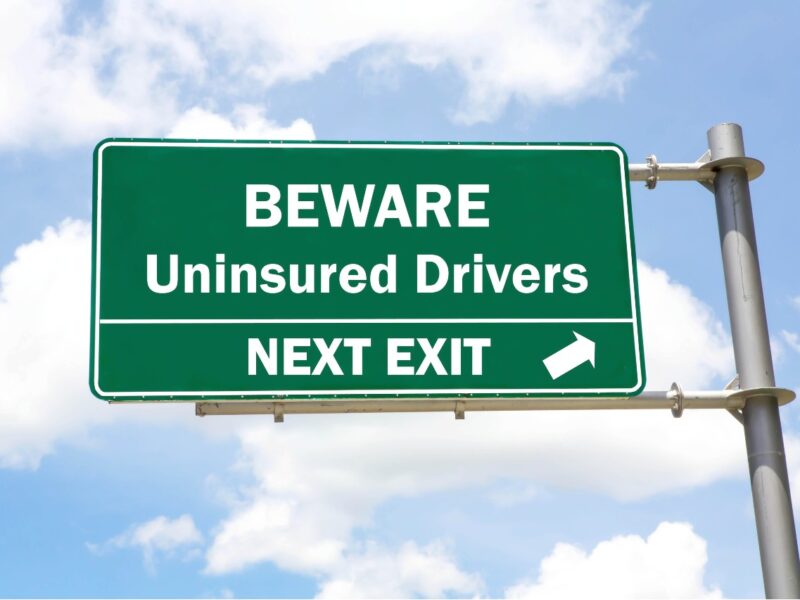Getting into a crash is stressful enough – but finding out the other driver has no insurance makes it worse. Tens of thousands of drivers in California don’t carry insurance, and even those who do, some carry only minimum coverage. That means you could be left footing the bill for medical care, car repairs, or lost wages, even when the accident wasn’t your fault.
This post will walk you through:
- California’s insurance requirements
- Why uninsured/underinsured coverage matters
- How to file a claim after a crash with an uninsured driver
- What damages you can recover
- Your legal options – including arbitration and lawsuits
California Auto Insurance Basics
California law requires drivers to carry at least minimum liability insurance. The current minimum liability coverage required is:
- $30,000 for injuries to one person
- $60,000 per accident for injuries to multiple people
- $15,000 for property damage
Despite this requirement, many drivers ignore it or purchase lower-cost policies that don’t fully protect victims in serious crashes.
What Is UM/UIM Coverage — And Why It Matters
Your best protection after a crash with an uninsured or underinsured driver is using your own insurance:
- Uninsured Motorist (UM): Covers you if the at-fault driver has no insurance at all.
- Underinsured Motorist (UIM): Helps if the driver’s policy limits are not enough and don’t fully cover your damages.
UM/UIM coverage may not be mandatory in California, but it’s strongly recommended, because without it, you could end up responsible for paying your full medical and vehicle repair bills.
What to Do After the Crash
- Report the crash from the scene to the police and obtain a police report.
- Seek medical care immediately, even if you are unsure of the extent of your injuries – and make a record of all medical treatments you receive.
- Document the accident scene: take photos, get witness contact info, and record the other driver’s name, license plate, and insurance information.
- Talk to an experienced California car accident lawyer to ensure your legal rights are protected and your claim is handled correctly.
How a Claim Under UM/UIM Coverage Works
Once your attorney informs your insurer that the responsible party was not insured:
- Your UM or UIM coverage becomes the primary method of compensation.
- Your insurer will review the policy, gather documentation, and may request medical records or other evidence.
- If your claim is denied or undervalued by your insurer, you often will have the right to pursue arbitration or legal action depending on your specific insurance policy terms.
- A skilled attorney can handle any negotiations or formal proceedings and push for full and fair compensation.
Statute of Limitations in California
- You generally have two years from the date of the accident to file a personal injury lawsuit.
- If you were injured by a government entity (for example in a trip and fall on a broken city sidewalk, or hit by a city bus driver), that deadline drops to just six months from the date of the accident.
- Insurance policies may also impose shorter deadlines for UM/UIM claims — so it’s critical to act quickly and meet all time limits.
How Much Compensation Is Possible?
Economic Damages
- Medical expenses (past and future)
- Lost wages (past or future) and decreased earning capacity
- Rehabilitation costs
- Property damage repair or replacement
Non-Economic Damages
- Pain and suffering
- Emotional distress, psychological trauma
- Loss of enjoyment of life
- Disfigurement or disability
If the driver responsible for the accident has no insurance or limited liability coverage, your UM/UIM benefits may cover the rest – up to the amount of your insurance policy limits.
Your Legal Options & Limitations
- You can sue the third-party uninsured driver, but recovery depends on whether they have the assets to pay your claim.
- You can also explore whether there are other negligent third-parties to pursue and make claims against, such as suing an employer or others if their negligence contributed to your crash. For example, if an employee is driving for their employer, the employer can also be pursued.
- You can pursue a UM/UIM claim with your own auto insurer.
- If your own insurance company fails to treat your UM/UIM claim in good faith, you may have legal grounds to pursue a bad-faith insurance claim.
Frequently Asked Questions About Accidents With Uninsured Motorists In California
Can I really recover compensation if the other driver had no insurance?
Yes – if you have UM/UIM coverage. Insurance companies in California are required to offer it, and it becomes your best source of compensation after a crash with an uninsured or underinsured driver.
What if my damages exceed my policy limits?
If your damages exceed both the at-fault driver’s negligible or nonexistent liability coverage and your UM/UIM policy, you may pursue a lawsuit – but the defendant’s ability to pay may be limited.
Does using UM/UIM coverage affect my insurance rates?
No. California law prevents insurers from increasing your premiums if the accident wasn’t your fault and you’re filing a claim under your own UM/UIM coverage.
Is an attorney necessary for a UM/UIM claim?
While not required, legal help is often necessary and important to ensuring the insurer honors your coverage and pays you the proper compensation you are entitled to. A lawyer also helps navigate disputes, denied claims, and other insurance road blocks.
What if the at-fault driver is uninsured AND unlicensed?
You still file your claim under your UM coverage. Your attorney will pursue compensation using that coverage and, if possible, identify other liable parties who may provide compensation for your damages.
Don’t Get Left Holding the Bill for an Uninsured Motorist — Take Action Now
An accident with an uninsured driver can be frustrating and complex – but it doesn’t mean you’re on your own. With the right coverage, quick action, and experienced legal help, you can recover compensation for your bills and injuries.
If you’ve been injured in a crash with an uninsured or underinsured driver in the San Francisco Bay Area, reach out today for a free case evaluation. The Hassell Law Group is here to guide you through the process and get you the compensation you deserve.
The general information provided on this website should not be considered legal advice and does not constitute legal advice. For legal advice, you should consult directly with an attorney. If you contact us by telephone, email, letter, or by contact form submission through this website, please note that such communication does not create or constitute an attorney-client relationship. We cannot act as your attorney until we are hired as your attorney by a formal written agreement.


 What Should You Do After A Slip And Fall Accident?
What Should You Do After A Slip And Fall Accident?